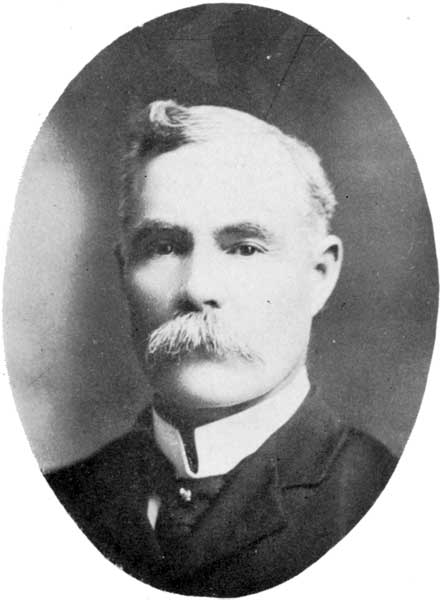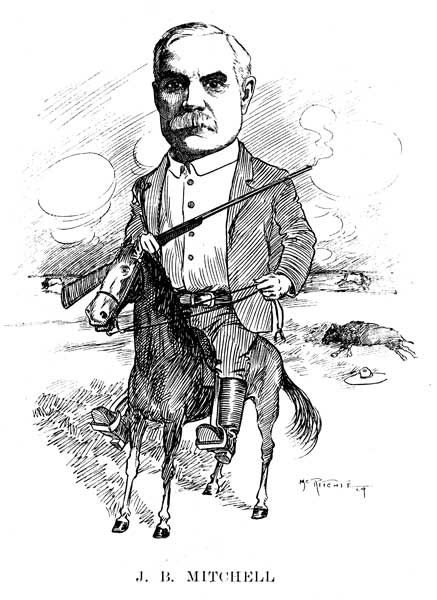 |
James Bertram Mitchell
|
Policeman, architect.
Born at Gananocque, Leeds County, Ontario on 14 October 1852, son of George Mitchell and Jane Brown, he was educated at the Gananocque High School and Montreal Art School. He joined the Canadian militia as a bugler at the age of 14, rising to corporal by 1870. Upon promotion, he was assigned to guard the Welland Canal at Carlton, Ontario against a Fenian invasion of Canada, an event that never took place. During his time in the militia, he met Colonel George A. French, soon to be the head of the newly minted North West Mounted Police (NWMP). It was a defining meeting for the young Mitchell.
 |
James Bertram Mitchell
|
At age 18, Mitchell returned to civilian life and studied architecture at the Montreal Institute of Art for three years. He had read newspaper accounts of the difficulties at Red River and the whisky problem in the West. Stemming from his desire to serve his country and his strong sense of adventure Mitchell enlisted and at age 21 and was assigned NWMP regimental number 50, E division with the rank of Staff Constable.
The NWMP departed Fort Dufferin on 8 July 1874. During his time with the force, Mitchell signed as witness with Governor Morris’ Treaty with the Wood and Plain Cree Indians at Fort Carleton and Fort Pitt on 23 August and 9 September 1876. Having passed through Winnipeg during his time with the NWMP, when Mitchell returned to civilian life, he remembered the opportunity he felt existed in this new prairie city. He settled in the Point Douglas area.
He was elected to the Winnipeg School Board in 1888 and in 1892 was appointed Architect and Commissioner of School Buildings and Supplies. Along with his contemporary, School Superintendent Daniel McIntyre, Mitchell designed and created what some saw as North America’s safest and most architecturally eloquent collection of schools. Together the two men oversaw the design and construction of 48 Winnipeg schools and numerous additions. During his tenure, Mitchell witnessed the value of school buildings grow from less than $350,000 to nearly $10 million.
Some of the Winnipeg schools that Mitchell designed:
School
Location
Year
Status
775 Sherbrook Street
1901
Demolished (2005)
Edmonton Street
1902-1903
Demolished (1969)
344 Graham Avenue
1903
Demolished (April 1930)
765 Pacific Avenue
1903
Burned and rebuilt (1945)
McGregor Street
1904
Demolished (1963-1964)
649 Ellice Avenue
1905
Demolished (1964)
Wellington Avenue
1906
Demolished (?)
111 Polson Avenue
1907-1908
Selkirk Avenue
1908
Demolished (1975)
Maryland Street
1908
Casey Street
1908
136 Cecil Street
1908
Clifton Street
1908
Brazier Street
1908-1909
Demolished (early 1970s)
444 Flora Avenue
1909
Demolished (c1988)
850 St. Matthews Avenue
1909
Demolished (?)
290 Lilac Street
1909
55 Harrow Street
1910
Demolished (1965-1966)
Machray Avenue
1910
Demolished (?)
545 Alexander Avenue
circa 1910
Demolished (?)
Daly Street South
1910
Demolished (1970)
1150 Sherburn Street
1912-1913
960 Wolseley Avenue
1912-1913
1265 Barratt Avenue
1913
200 Powers Street
1914
Demolished (c1976)
265 Grey Street
1915
340 Cockburn Street North
1914
Luxton School (addition)
111 Polson Avenue
1915-1916
John M. King School (addition)
649 Ellice Avenue
1918
Demolished (1964)
611 Academy Road
1918
77 Henderson Highway
1919
Demolished (2005)
465 Banning Street
1919
Demolished (1997)
East Street
1920
Demolished (?)
Montcalm School
Tecumseh Street
1920
Demolished (?)
Andrews Street
1920
Demolished (?)
31 Shaughnessy Street
1920
Demolished (2003)
Mountain Avenue
1921
Demolished (?)
270 Stella Avenue
1922
Grosvenor Avenue
1922
405 Parr Street
1925
Influenced by British Board Schools, Mitchell created powerful, stately buildings that he felt nurtured the physical and intellectual potential of all children, no matter what their country of origin. British Board Schools were massive red brick buildings, usually three storeys, with similar design and layout. Hundreds of them were built between 1870 and 1900. Their style captured the imagination of the public and became the defining characteristic of enlightened education. Mitchell used the Board Schools as his basic design, enhancing the already handsome buildings with decorative details from Queen Anne, Gothic, Classical and Georgian Revival architectural styles. He served as President of the Manitoba Association of Architects (1916-1917).
Always eager to learn new techniques and designs, Mitchell traveled across Canada and the United States, touring educational facilities and discussing their design with his peers. He brought home many new ideas for his schools. But always foremost in his mind was that fundamental education would be provided, children would be enlightened and all of Canada would benefit. He retired in 1928.
He was married twice, first to Helen Richmond Brough of Gananocque with whom he had three children: Rosslyn Brough Mitchell, Edith Helen Mitchell (1879-1961, wife of John Ralston Davidson), and Elinor Mitchell (?-?). His second wife was Margaret “Maggie” Booth (1886-?) of Scotland. He served as President of the Canadian Club of Winnipeg (1908-1909). During the First World War, Mitchell served as Lieutenant-Colonel of the 100th Grenadiers from 1912 to 1920, taking them to Valcartier in August 1914 (11th Battalion, Canadian Expeditionary Force). He raised the 78th Battalion in 1915 and the 100th Battalion which he took overseas in 1916. He saw action at St. Eloi and Vimy.
He died on 14 November 1945 and was buried in the Brookside Cemetery. He is commemorated by J. B. Mitchell School in Winnipeg. There are papers at the Archives of Manitoba.
See also:
Historic Sites of Manitoba: Mitchell House (45 East Gate, Winnipeg)
Historic Sites of Manitoba: J. B. Mitchell School (1720 John Brebeuf Place, Winnipeg)
Who’s Who in Western Canada: A Biographical Dictionary of Notable Living Men and Women of Western Canada, Volume 1, edited by C. W. Parker, Vancouver: Canadian Press Association, 1911.
The Leading Financial, Business & Professional Men of Winnipeg, published by Edwin McCormick, Photographs by T. J. Leatherdale, Compiled and printed by Stone Limited, c1913. [copy available at the Archives of Manitoba]
Pioneers and Prominent People of Manitoba, Winnipeg: Canadian Publicity Company, 1925.
“Last tributes paid to Mitchell,” Winnipeg Tribune, 19 November 1945. [Manitoba Legislative Library, Biographical Scrapbook B9]
“Buried today [Mrs. Mary M. Booth],” Winnipeg Tribune, 10 April 1935, page 10.
Dictionary of Manitoba Biography by John M. “Jack” Bumsted, Winnipeg: University of Manitoba Press, December 1999, 288 pages.
Biographical Dictionary of Architects in Canada, 1800-1950 by Robert G. Hill, Toronto.
We thank Jordan Makichuk and the Manitoba Association of Architects for providing additional information used here.
This page was prepared by Reid Dickie and Gordon Goldsborough.
Page revised: 22 September 2025
Memorable Manitobans
This is a collection of noteworthy Manitobans from the past, compiled by the Manitoba Historical Society. We acknowledge that the collection contains both reputable and disreputable people. All are worth remembering as a lesson to future generations.
Search the collection by word or phrase, name, place, occupation or other text:
Custom SearchBrowse surnames beginning with:
A | B | C | D | E | F | G | H | I | J | K | L | M | N | O | P | Q | R | S | T | U | V | W | Y | ZBrowse deaths occurring in:
1975 | 1976 | 1977 | 1978 | 1979 | 1980 | 1981 | 1982 | 1983 | 1984 | 1985 | 1986 | 1987 | 1988 | 1989 | 1990 | 1991 | 1992 | 1993 | 1994 | 1995 | 1996 | 1997 | 1998 | 1999 | 2000 | 2001 | 2002 | 2003 | 2004 | 2005 | 2006 | 2007 | 2008 | 2009 | 2010 | 2011 | 2012 | 2013 | 2014 | 2015 | 2016 | 2017 | 2018 | 2019 | 2020 | 2021 | 2022 | 2023 | 2024 | 2025
Send corrections and additions to this page
to the Memorable Manitobans Administrator at biographies@mhs.mb.caCriteria for Memorable Manitobans | Suggest a Memorable Manitoban | Firsts | Acknowledgements
Help us keep
history alive!